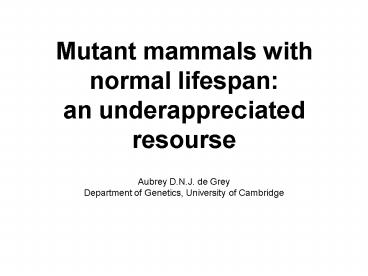Mutant mammals with normal lifespan: - PowerPoint PPT Presentation
1 / 13
Title:
Mutant mammals with normal lifespan:
Description:
... there's the rub; For in that sleep of death what dreams may come When we have ... Failed shortening of LS: potentially informative! ... – PowerPoint PPT presentation
Number of Views:59
Avg rating:3.0/5.0
Title: Mutant mammals with normal lifespan:
1
Mutant mammals with normal lifespan an
underappreciated resourse Aubrey D.N.J. de
Grey Department of Genetics, University of
Cambridge
2
A self-evident truth
3
A self-evident truth
4
The tragedy of the negative result
5
Biogerontologists abandon Popper at their
peril de Grey 2000, BioEssays 22206-207 Hypothes
is H the rate of process P limits (may
determine, but not necessarily -- call this
stronger version H) a given populations
maximum, mean lifespan Known fact process P
causes accumulation of marker M i.e. M is a
marker of a putative LS-limiting process,
MPLP) When and how can measurement of M falsify
H?
6
One out of eight aint bad
7
Successful shortening of LS uninformative
- M unchanged H not falsified (we harmed the
- organism, but so what? -- we failed to accelerate
P, so we didn't even test H) - M faster H not falsified (this was its
prediction)
8
Failed extension of LS uninformative
- M unchanged H not falsified (we didnt help the
- organism, but so what? -- we failed to retard P,
so we didn't even test H) - M slower H not falsified (though H is falsified)
9
Successful extension of LS uninformative
- M unchanged H not falsified (we benefited the
- organism, but so what? -- we failed to retard P,
so we didn't even test H we may have merely
improved tolerance of M) - M slower H not falsified (this was its
prediction)
10
Failed shortening of LS potentially informative!!
- M unchanged H not falsified (we didnt harm the
- organism, but so what? -- we failed to accelerate
P, so we didn't even test H) - M faster H falsified!! We accelerated P and the
- organism didnt care, so P does not limit its LS
11
A seductively similar pair
- (A) Successful extension of lifespan, M unchanged
- (B) Failed shortening of lifespan, M accelerated
- In both cases, the organism survives a higher
level of M than normal. - Why does only (B) falsify H?
- In (A), M may still be key we may have just
improved tolerance of M. - In (B), for that to be true, our intervention
must have been both good and bad for the
organism speeding progression of M but improving
tolerance of M! Occam would disapprove.
12
Examples
- - TERC-/- several labs, all focusing on
late-generation mice! - - TERT-/- one Japanese lab
- - MnSOD/- a few US labs, but many things not
reported - - mtDNA deletions
- - lipofuscin accumulation
- - AGE, AGE precursor accumulation
- - telomere shortening
- - .......
- - CuZnSOD-/- one US lab
- - ECSOD-/- nobody
- masses of promising genetic alterations that
have not been - made, let alone tested, e.g. combinations of the
above
13
Conclusion Correlation does not imply
causation BUT non-correlation DOES imply
non-causation































![[PDF] Growth and Development Across the Lifespan 3rd Edition Ipad PowerPoint PPT Presentation](https://s3.amazonaws.com/images.powershow.com/10079281.th0.jpg?_=20240716061)